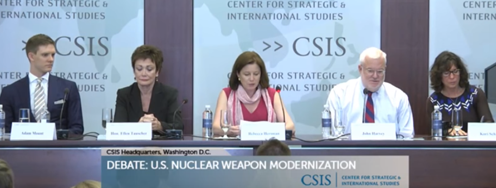Understanding Pakistan
Whether you are concerned with success in Afghanistan, preventing nuclear terrorism, or any other host of global security issues, the link between the stability of Pakistan and the security of the world is very clear. To better understand this region of the world the Council on Foreign Relations recently released “Crisis Guide: Pakistan” -- an interactive, beautifully edited, and authoritative analysis of the current state of affairs in South Asia.
Last week reports of increased construction at Pakistani nuclear facilities spurred a range of articles on Pakistan’s nuclear program and the security of the regime. Ploughshares Fund President Joe Cirincione was quoted in an AFP article saying, "It's the security of the government that worries me. If the government falls that's when the nightmare comes…American politicians and policymakers live in a constant state of denial about Pakistan. They see a mess and then they look away and pretend it's all going to get better somehow.”
CFR's “Crisis Guide: Pakistan” provides an in-depth and comprehensive look at the country's history and possible futures. The CFR expert interviews feature many prominent Ploughshares Fund grantees and affiliated organizations, including Shija Nawaz of the Atlantic Council, Ashley Tellis of the Carnegie Endowment for International Peace, Pervez Hoodbhoy, and Steve Coll of the New America Foundation. Ploughshares board member Reza Aslan is also featured in the videos.
As Steve Coll explains in the presentation, “Pakistan’s stability is in the world’s interest…As Pakistan has developed, the sources of its instability have acquired global dimension.” Similarly, President Obama rightly acknowledged in his speech on Afghanistan strategy at West Point in 2009, “We will act with the full recognition that our success in Afghanistan is inextricably linked to our partnership with Pakistan.”
Setting the stage for expert analysis, CFR directs its study towards five potential futures for Pakistan: State Adrift, Authoritarian State, Islamist State, Moderate State, and State Collapse. Consensus among the featured panel of experts is that while a collapsed state is unimaginably frightening, the most likely future in the near-term is a "State Adrift", in which Pakistan muddles through its problems until something forces it onto a different path. The United States must, therefore, consider how it can influence Pakistan to become a stable and predictable ally in the region.
Attempting to make sense of a swath of issues that Pakistan faces, the CFR study also focuses on examining seven key areas: Demographic Pressures, Economic Hurdles, Ethnic and Political Factionalism, Governance, Islamic Radicalization, Militancy, and Nuclear Concerns. Each of these challenges will be of great significance to future Pakistan and the effectiveness of cooperation with the United States.
Check out the interactive study here.


